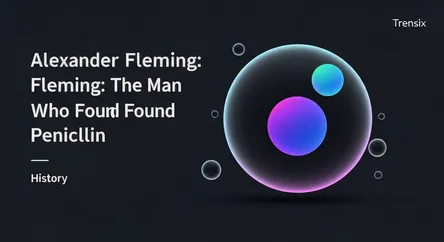History
Alexander Fleming: The Man Who Found Penicillin

The story of Sir Alexander Fleming, the Scottish scientist whose accidental discovery of penicillin in 1928 revolutionized medicine forever.
What is it?
Sir Alexander Fleming was a Scottish physician and microbiologist. He is famously credited with discovering the world's first broadly effective antibiotic substance, which he named penicillin. The discovery happened by chance in 1928 when Fleming returned from a vacation to find that a mold, from the Penicillium genus, had contaminated a petri dish in his London laboratory. He noticed this mold was preventing the growth of the bacteria around it. This observation marked a turning point in medical history and laid the foundation for the age of antibiotics.
Why is it trending?
Fleming's legacy remains a cornerstone of modern medicine. His discovery is continually revisited in discussions about medical breakthroughs and the ongoing crisis of antibiotic resistance—a problem he prophetically warned about. For his work, Fleming, along with Howard Florey and Ernst Chain who helped develop penicillin into a usable drug, was awarded the Nobel Prize in Physiology or Medicine in 1945. This recognition cemented his place as one of the most important figures of the 20th century.
How does it affect people?
Fleming's discovery fundamentally changed the world. The development of penicillin transformed the treatment of bacterial infections, saving millions of lives from illnesses like pneumonia, syphilis, and rheumatic fever. Before penicillin, even a minor cut could lead to a fatal infection. The mass production of this first true antibiotic proved vital during World War II, treating countless soldiers and civilians. This breakthrough drastically reduced death rates from bacterial diseases and ushered in an era of medicine with effective cures, profoundly impacting global health.